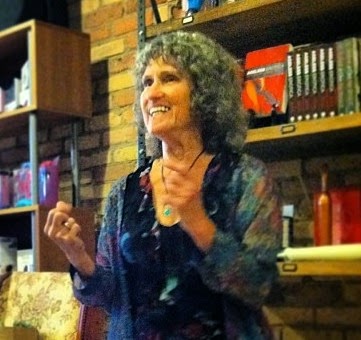Doctors, Talk to Us about Our Sex Lives!
 |
4/3/16: I’m bringing this 2014 post to the top because I’m giving a talk to doctors and other medical professionals tomorrow in Milwaukee. I want these comments from my readers to be easy to find if they read my blog after that — which I hope they will!
About half of all sexually active men and women aged 57-85 in the United States report at least one bothersome sexual problem; one third report at least two. Yet only 38 percent of men and 22 percent of women reported having discussed sex with a physician since the age of 50 years.
Why does this information barrier exist? And what can you, as professionals, do to overcome it with your patients and clients?
These are the questions I posed to the attendees at the beginning of “Talking about Senior Sex:
A Presentation for Medical Professionals, Therapists, and Others Working Professionally with the Older-Age Population,” which I presented at The Smitten Kitten in Minneapolis on June 19, 2014.
I was so jazzed by the responses during that workshop that I wanted to continue the discussion, so I took it to my Naked at Our Age Facebook page (which I invite you to read and “like”).
Our community jumped in eagerly with their comments and experiences. Here are some of those:
- It would suffice if they just asked. I think they are 1) embarrassed, and 2) afraid that a nestful of psychological tangles would emerge, which would take a lot of their time. As a doctor, you would have to believe that relationships, beliefs, and habits contributed to illness, and I think most of them are just looking for a set of symptoms. The mind-body connection is far from their thoughts.
- It may be difficult for physicians to broach topics on sex because of their lack of education on sexual matters – not just with senior sexuality. Often such topics are delegated to nurse specialists or physician assistants. There are also shades of sexuality beyond the range of physiology, endocrinology, anatomy, and other hard sciences that are beyond the scope of topics covered in med school and continuing medical education. We need to take charge and help drag medical providers along with us on this topic.
- Sex over 55 is often challenging if your parts are in perfect working order, but if they are not, then it’s an entirely different ball game. As someone who has lived with a sexual challenge for 20 years (and who is now 67), I found, in the beginning that it was helpful to write a letter to the doctor prior to the appointment – an ice-breaker. Now, however, after such a long-term medical problem, I am really very open with all the doctors I see and they either handle it or they don’t – they can choose!
- We live in a culture that allows only a few sexual subjects to be discussed and those in limited ways. Having lived a lifetime hiding or being ashamed of our sexual natures, it can be a huge challenge to just start talking about “it” when we reach those years. The mechanics of sex may be easier to discuss than unmet needs and innate desires. It is a gift to be sexually sovereign in our culture.
- In my case, no doctor ever broached the subject. I was always the initiator. After 12 years of fertility work, four ectopic pregnancies, numerous spontaneous abortions and nerve damage resulting from a rape, surgeries and malpractice (they refused to remove the infamous Dalkon Shield IUD after the rape and subsequent STD infection), it’s not a stretch to understand why I had a damaged libido. Only with recent help from two amazing physicians, with whom I can discuss anything, have I begun to find help! Finding this and other groups online has also been salvation of yet another kind. Thanks for opening so many doors to those of us who have foundered for so long!
- Actually, it was through conversations with my nurse practitioner that my road to sexual freedom opened up. Also through my wonderful husband’s patience, and Joan’s book, Naked at Our Age. There is a taboo about sex at a certain age, but for us it has just been renewed!
- Particularly as sex and disability is also a taboo subject and many people will have genital dermatoses and that will make it even harder for them to open up to anyone. I am 67 and despite lichen sclerosis, I remain sexually active.
- The doctor needs to be calm, confident and comfortable with the subject. If the doctor is squirmy and clearly uncomfortable, it won’t help the patient to open up. Speaking for myself, if I’m a little squirmy and hesitant, I’d appreciate it if the doctor would give me the time and space to squirm a little and build up my courage. I had that experience with a doctor; he asked what was clearly a scripted question, I hemmed and hawed a little struggling to express an answer. Since the answer wasn’t immediately forthcoming he just jumped right to the next question. I got the distinct feeling he really didn’t want to hear it, so the subject was dropped. On the other hand, a doctor might ask a question and get a very forthright answer they weren’t expecting. They better be ready for that too; no eyes bugging out, no jaw dropping, no flinching. They might need to develop the ‘warm positive regard’ thing that therapists are taught.
- I’m 73, have an older woman doctor trained in Europe who brought the subject up in the course of an annual physical, and was quite matter of fact about it, made me quite comfortable discussing the subject, and referred me to an endo.
- I’m not your target age group but my nurse practitioner at Kaiser simply asked if I was happy with my sex life and, after I affirmed that I was, proceeded to tell me that orgasm was good for my vaginal health (not to mention my psyche) and encouraged me to take charge of my pleasure because it would help make perimenopause easier to take, keep my bladder where it belongs and generally support my wellbeing. Hell yeah -this I knew – but what was even better was that she made it clear that she was there to help. My sexual health was not some secondary aspect. It was a full-fledged piece of my gynecological workup. To which I say – well done!
- I’d like to see it simply become a matter of routine during all regular check ups, or anytime the visit is for more than a sniffle really, as well as anytime mental health/ relationships are discussed. We need to be in the habit of treating the whole person, not just fixing bits and pieces and mending boo-boos.
I hope you’ll continue this important conversation by commenting here. (And if you’d like me to bring this presentation to your organization, please contact me.)

Me, 65ish, a man…
Good luck Joan w/ the conference w/ docs; so important. I gave my doc a copy of your book last book!
Things I have brought up with my doctor, a woman:
Anorgasmia, anal sex, multiple partners, condoms, STI tests (a few I had to ask for}, Viagra, Cialis; masturbation, hypogonadism.
Actually, she is the one who noticed I was losing muscle in my ass and wanted me tested for low T, not me. Now I shoot Testosterone each week in my Rt. thigh.
Guys who don't work with their docs and ASK stuff are just stupid; they don't want to live long or fuck and love into their older years like I want to. I hope you can wake some docs up. My doc admitted that bringing up the topic of sex is frightening due to law suits; with men patients; and with women patients. Sad.
Joan, this is such a great discussion, and I hope that your workshop will make the rounds of the US.
I'm actually looking at building a consulting brand that focuses on better educating doctors on women's sexual health and how to better serve their patients with these conversations. I would be really interested to talk with you about any connections you have in the industry and how we might work together to make the medical community more sex-positive. Email me at bianca@thegardendc.com if you have a minute. 🙂
Doc visits are budgeted for 20 min. so you have to go in with a laundry list of what is important to you. I started skipping the robe and being naked for the physical, knowing a testicular and prostate exam was part of the deal. WE as patients need to care about this, take the initiative, love our bodies.
My doc, a woman, diagnosed me last year (at 65) with low T and is helping my wife with low libido because WE brought it up. Can't blame the doc. You've got 20 min for doc visit and maybe 30 for an annual exam. Got to speak up. We talk easily now about RE and such (Retarded Ejaculation); it was more me than the doc.
Joan, excellent article and a great one to share with physicians and other health practitioners. I got to talk an OB-GYN, a psychiatrist and Dr. Carol Queen at Good Vibrations about this topic in an article I posted a few weeks ago, http://agoodwomansdirtymind.com/talking-to-your-doctor-about-sexual-problems/. It's not age-specific, but this topic is so important to adults of all ages.